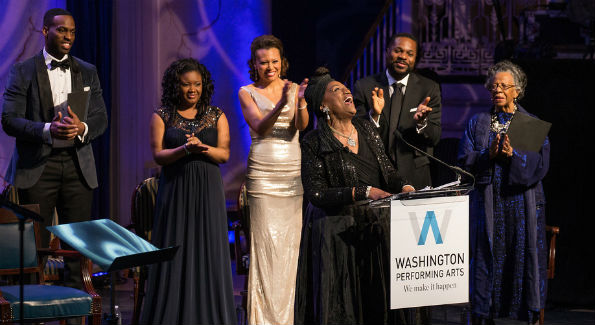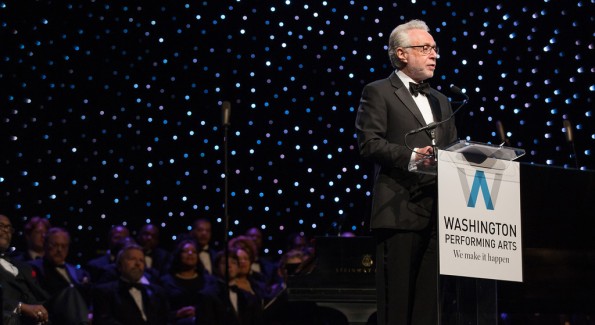WPA hosted 75th anniversary celebration of Marian Anderson’s historic Lincoln Memorial concert.
By Patrick D. McCoy

Soprano Jessye Norman (center) hosted Washington Performing Arts’ 75th Anniversary celebration honoring the legendary contralto Marian Anderson. (Photo by Chris Burch Photography)
Seventy five years ago, the great contralto Marian Anderson sang on the steps of the Lincoln Memorial after being denied the right to perform in Constitution Hall by the Daughters of the American Revolution. It was First Lady Eleanor Roosevelt who made the Lincoln Memorial concert happen, which inevitably opened doors for scores of performing artists regardless of race. Recently, a diverse cast of performers came together in the very hall that Ms. Anderson was not allowed to sing in, DAR Constitution Hall, to honor the 75th anniversary of that historic concert.
Washington Performing Arts President/CEO Jenny Bilfield described the performance, “Of Thee We Sing,” as “the biggest thing that we have ever done” and several guests spoke throughout the night on the progress that has been made since Anderson’s Lincoln Memorial concert days. Soprano Jessye Norman served as Mistress of Ceremonies, while CNN host Wolf Blitzer, actor Malcolm Jamal Warner and rapper M. C. Hammer served as narrators, reading narratives throughout the night that tied together the various performances on the program. Billie Allen Anderson shared a heartwarming account of her 14-year-old self presenting Marian Anderson with a bouquet of roses when she was awarded the Spingarn Award, and photos of Anderson’s Lincoln Memorial concert hung throughout the room as a reminder of the progress that has been made.
Acting president of Howard University, Dr. Wayne Frederick, shared the university’s connection with Anderson. It was Howard that had invited Anderson to perform in Washington, and due to her international stature and to accommodate the projected large audience, Constitution Hall was approached to host the event. The Hall’s denial set the stage for the crowning moment in which Anderson performed the first ever concert at the Lincoln Memorial before an audience of 75,000. Rather than being a strict concert program, the WPA’s recent presentation was more like a festive celebration. Intermingled with spoken tributes and the genres of music prevalent throughout Anderson’s career, such as the opera aria and spiritual music, the evening portrayed a journey from the injustice Anderson suffered to a triumphant refrain of several hundred in the very hall where she would return to finally perform years later.

CNN anchor Wolf Blitzer was among the celebrities to offer tributes in honor of contralto Marian Anderson. (Photo by Chris Burch Photography)
The 75th Anniversary Chorus, which comprised singers from choirs all over Washington, opened the program with the spiritual “I Can Tell the World” arrangement by Moses Hogan. Led by Stanley J. Thurston, the choir filled the center stage and the singers ascended far into the rafters on both the left and right of the hall. The sound of the choir did not have the homogenous sound that one would expect from such a large aggregation singing together, due in part to the amplification of the voices through the house sound system. However, in this case, such a technical matter was barely a concern. Filled with visible spirit and contagious energy, the pulsating, rhythmic execution of Hogan’s arrangement was deserving of the rousing applause all by itself.
Soprano Alyson Cambridge sang the aria “Pace, pace mio Dio” from Verdi’s opera “La forza del destino.” At the onset, the aria seemed to lack vocal focus, due in part to the amplification necessary in the otherwise dry acoustic of Constitution Hall. As Cambridge acquainted herself with her surroundings, her voice bloomed with confidence and soared to the aria’s climax to the ecstatic approval of the nearly full house. In the choral setting of Langston Hughes’ “Mother to Son” by Undine Smith Moore, the young soprano Annisse Murillo showed great promise as her voice was radiant juxtaposed with the choral texture of the larger ensemble. The commissioned work “An Ave Maria for Marian Anderson” was a stunning tribute to the singer composed by Ysaye M. Barnwell. Brilliantly conceived, the foundation of the a cappella work was Schubert’s “Ave Maria” with the fragments of traditional spirituals providing an arch towards its profound ending.
The vocal tour de force of the evening came from the rising bass-baritone Soloman Howard in the aria “Il lacerato spirito” from Verdi’s “Simon Boccanegra.” Howard’s voice seemed to be at home in the cavernous space. Projecting vocally with a polished presence, both musically and visually, the singer provided a sense of majesty that Anderson must’ve felt as she stood among the towering columns of the Lincoln Memorial. In that special moment created by Howard, it was like the entire humanity of the audience applauded his triumph, a triumph in many ways made possible by Anderson. “The Met [Metropolitan Opera] will be lucky to have you,” said Norman as Howard was accorded a standing ovation. Pianist Kevin J. Miller was also a standout in his sensitive, yet musically solid accompaniment.
Anderson always ended her recital programs with spirituals. The famed Winan Brothers sang the traditional communion spiritual “Let Us Break Bread Together.” Accompanied by Thurston on piano, the trio of singers sang with a certain level of harmonic uncertainty. In “Wade in the Water” legendary songstress Dionne Warwick and American Idol winner Candace Glover seemed to dual for one-upmanship in a musical work that in its ideology, moves mentally beyond the self.
Just before the celebration’s end, the evening’s Mistress of Ceremonies surprised the audience with an impromptu performance of the spiritual “He’s Got the Whole World in His Hands.” Norman, who is certainly one of the beneficiaries of Anderson’s legacy, expressed her appreciation amid thunderous applause. Ending the celebration was the entire company of singers and hosts in “My Country Tis of Thee.”
In a great way, the spirit of Marian Anderson returned to the very city that Washington Performing Arts seeks to “make its stage.”
Recently named among the Forty Under 40 for his contributions to arts and humanities, Patrick D. McCoy received a B.M. in vocal performance from Virginia State University and a M.M. in church music from the Shenandoah Conservatory in Winchester, Va. , where he serves on the alumni board of directors. He has contributed arts and culture pieces to CBS Washington, The Afro-American Newspaper and the newly published book, “In Spite of the Drawbacks” (Association of Black Women Historians), which includes his chapter on legendary soprano Leontyne Price. McCoy has interviewed some of the most acclaimed artists of our time, including Renée Fleming, Joshua Bell, Martina Arroyo, Denyce Graves, Eric Owens, Norman Scribner, Julian Wachner, Christine Brewer and Lawrence Brownlee. He is music director at Trinity Episcopal Church, DC. Listen to these interviews and others at Blog Talk Radio. Additionally, he is a member of the Music Critics Association of North America. McCoy may be reached via email at wlperformingarts@aol.com and on Twitter @PatrickDMcCoy.
